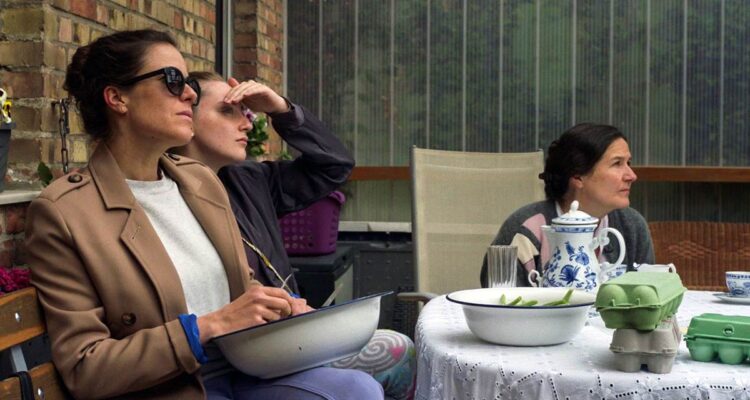It is a misconception that a movie must be about “something” in the traditional sense, what with the introduction of conflict resolved through a three-act structure. Fellini, Mallick, and others have eschewed this more rigid cinematic formula, yet while movies like “La Dolce Vita” or “Tree of Life” mine broader social and spiritual themes by way of aesthetic collages of multitudes, “Talking About the Weather” seems content to pick around the edges of just one story.
Clara (Anne Schäfer) is a woman besieged by conflict and turmoil, and as the audience gets to know her throughout the first 20 or so minutes of “Talking About the Weather,” it is clear why. Grinding through the final stages of her PhD program and in the midst of an affair with one of her students (who, unlike her, isn’t keen on keeping it casual), she’s also looking ahead to a visit home for the birthday party of her mother, Inge (Anne-Kathrin Gummich). The trip will take her and her daughter Emma (Emma Frieda Brüggler) back to East Germany, where Clara’s philosophy credentials and Berlin address don’t exactly endear her to the locals.
This is very much Clara’s story in the broadest sense, but writer/director Annika Pinske seems less interested in the woman and more in the idea of what she represents. While this is often informative as a character trait (i.e., understanding this person’s place in the modern world), it gives the audience next to nothing to latch onto or care about through all 89 minutes of its runtime. Although “Talking About the Weather” is outwardly sympathetic to the modern woman’s struggle to protect her autonomy and independence in a world that seems to demand her pliant submission, it makes for a very cold and dispassionate viewing experience.
Always (understandably) with her guard up and on the defensive against anti-intellectual snipes or sexist jibes from her peers, Schäfer plays Clara with a detached aloofness that makes it all but impossible to get on her side. Every problem that she encounters (outside of casual misogyny) seems to be one of her own making, be it the strained relationship with her mother, the growing divide between her and Emma, the dumpster fire that is her romantic life, or the pressure of her professional one. Interesting at times, sure, yet the audience never gets to know Clara enough to make any of this meaningful.
Indeed, although Pinske has crafted a number of scenes, few of them inform the texture of Clara and this world outside of the direct conflict presented moment-to-moment. For example, Clara lives with two male roommates, yet the nature of her relationship with them remains unclear throughout the picture. Is she dating one or both of them? Do they feel strained in their relationship with her in the same way Clara’s mother and daughter seem to?
Put another way, there’s no world outside of what’s presented in these 89 minutes: no idea of who Clara was before all of this, and little to inform what she might be like after the credits roll. The thematic undercurrent is there, as this is undoubtedly a story about a woman struggling to find her place between two worlds: one rooted in modern feminist ideals, and the other anchored by traditional gender roles. Yet since the guide through this journey is both unsympathetic and largely unknown to the viewer, the audience has little incentive to get lost in this world and amongst these characters.
It is a problem the film never figures out, and despite some interesting moments and genuine drama, the larger effort never overcomes this obstacle. With the exception of Clara, all of the characters function as one-note sidepieces in a production that treats them less as fully realized people, and more as disposable pawns to be positioned for Clara’s journey. Emma’s always looking for the wifi password, Inge is always avoiding confrontation, and Clara’s affair partner just can’t take a hint: that’s it.
A pastiche of 21st century feminist ideals rooted in valid, understandable pathos, “Talking About the Weather” fails to do the work necessary to connect its lead with the audience in a meaningful way. Unmoored from structure, traditional narrative beats, and a discernable character arc, the film also fails to connect with a broader contextual story in a way that might integrate it (and its themes) with the world outside of Clara’s. Visually arresting, and full of sturdy performances that never get lost in the thoughtful mise en scéne (the wild kids running around, drunks shambling through, and party guests bumping all serve a purpose), this one too often trades substance for vibe, abandoning Clara and the audience to the narrow, underdeveloped world where this movie lives. [D]

